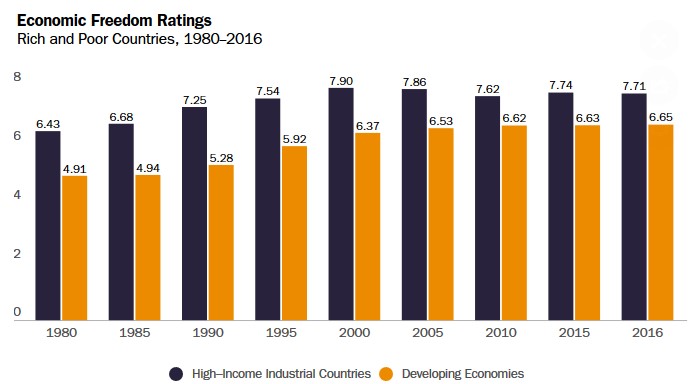According to the Economic Freedom of the World: 2018 Annual Report—co-published today in the United States by the Fraser Institute (Canada) and the Cato Institute—the United States has returned to the list of the top ten freest economies in the world after an absence of many years and a decline that began around the year 2000. The United States ranks 6th on the index.
[REITs]
Q2 hedge fund letters, conference, scoops etc
“During the 2009–2016 term of President Obama, the US score initially continued to decline as it had under President Bush. From 2013 to 2016, however, the US rating increased from 7.74 to 8.03. This is still well below the high-water mark of 8.62 in 2000 at the end of the Clinton presidency,” note authors James Gwartney, Robert Lawson, Joshua Hall, and Ryan Murphy.
In the aftermath of the financial crisis, the five broad areas of freedom that the report measures—size of government, legal system and property rights, monetary policy, trade openness, and regulation—saw falls in their U.S. scores that in recent years have begun to recover.
Some Interesting Trends
This year’s report ranks 162 countries and covers data through 2016, the most current year for which internationally comparable data is available. The index continues to find a strong relationship between economic freedom and a host of indicators of human well-being, including prosperity. The top ten countries in order are: Hong Kong, Singapore, New Zealand, Switzerland, Ireland, United States, Georgia, Mauritius, United Kingdom, and, tied at 10th place, Australia and Canada.
As a group, high-income industrial countries experienced declines in their level of economic freedom that began last decade. The graph below from the report shows that those levels have improved somewhat in recent years. It also shows that the gap in economic freedom between rich and poor countries has been closing notably since 1980, with most of that gain coming from increases in developing countries’ economic freedom even as developed countries increased their freedom during the same time.
Find out where other countries rank and the relationship between economic freedom and longevity, gender equality, happiness, income and more here.
This article is reprinted with permission from Cato at Liberty.
Ian Vásquez
Ian Vásquez is the director of the Cato Institute’s Center for Global Liberty and Prosperity. His articles have appeared in newspapers throughout the United States and Latin America, and he is a columnist at El Comercio (Peru). Vásquez has appeared on CNBC, NBC, C-SPAN, CNN, Telemundo, Univisión, and Canadian Television, as well as National Public Radio and Voice of America, discussing foreign policy and development issues.
This article was originally published on FEE.org. Read the original article.
![]()

